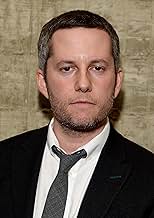AVALIAÇÃO DA IMDb
6,4/10
25 mil
SUA AVALIAÇÃO
Após a Segunda Guerra Mundial, um coronel britânico e sua esposa foram designados para morar em Hamburgo durante a pós-guerra, mas as tensões surgiram com o alemão que anteriormente possuía ... Ler tudoApós a Segunda Guerra Mundial, um coronel britânico e sua esposa foram designados para morar em Hamburgo durante a pós-guerra, mas as tensões surgiram com o alemão que anteriormente possuía a casa.Após a Segunda Guerra Mundial, um coronel britânico e sua esposa foram designados para morar em Hamburgo durante a pós-guerra, mas as tensões surgiram com o alemão que anteriormente possuía a casa.
- Direção
- Roteiristas
- Artistas
- Prêmios
- 1 indicação no total
Monika Foris Kvasnicková
- German Woman
- (as Monika Foris)
Avaliações em destaque
Keira Knightley is simply outstanding in this drama about a woman torn between two men at the end of WW2. Very much in the vein of a Merchant Ivory production; might seem old-fashioned by modern standards, but there is definitely a place for this type of film, which is largely missing from current productions. An enjoyable, moving and beautiful film.
The first hour set up the film excellently. However from that point the whole film felt torn between wanting to be an epic historical drama and a romantic drama whilst settling on either. Even at the end I had no idea what they were trying to accomplish with the film or what the supposed message was. Could have been a lot better had they settled on a theme. Still watchable but at the end all felt a little pointless.
There are some good performances in this film. Unfortunately, it suffers from a very predictable script.. I knew what people would say before they opened their mouths. Mediocre at best.
"The Aftermath" is based on the novel of the same name by Rhidian Brook and stars Keira Knightley, Alexander Skarsgård, and Jason Clarke in the lead roles. Set against the backdrop of a war-torn city, the film explores themes of loss, grief, love, and reconciliation in the aftermath of conflict.
One of the strengths of "The Aftermath" is its atmospheric setting. The film takes place in Hamburg, Germany, in 1946, just after the end of World War II. The devastated city, with its ruins and desolate landscapes, serves as a powerful backdrop for the characters' struggles and emotions. The production design and cinematography effectively capture the post-war era, creating a somber and melancholic atmosphere that adds depth to the story.
The performances in the film are exceptional. Keira Knightley delivers a compelling performance as Rachael Morgan, a grieving wife who arrives in Hamburg to join her husband, Lewis, played by Jason Clarke, who is a British colonel tasked with overseeing the city's reconstruction. Knightley portrays Rachael's inner turmoil with subtlety and emotional depth, capturing the complexities of her character as she grapples with her grief, guilt, and conflicting emotions.
Alexander Skarsgård is also impressive as Stefan Lubert, a German architect who lost his wife during the war and now works for Lewis. Skarsgård brings a quiet intensity to his role, displaying a range of emotions as Stefan forms a bond with Rachael, leading to a complicated romantic relationship that adds tension to the story.
The film's screenplay, adapted by Joe Shrapnel and Anna Waterhouse, delves into the aftermath of war and the challenges of reconciliation. It explores the complexities of human emotions, the scars left by war, and the struggle to move forward amidst grief and guilt. The film also delves into the tensions between the British and the Germans, as well as the conflicts that arise within Rachael and Lewis' marriage as they try to navigate their strained relationship in the aftermath of war.
Visually, "The Aftermath" is stunning. The film's period-accurate costumes, set designs, and cinematography effectively transport the audience to the post-war era. The contrast between the destruction of the city and the beauty of its surroundings creates a visually captivating experience that enhances the storytelling.
However, one criticism of the film is that the pacing can be slow at times, which may impact the engagement of some viewers. Additionally, some may find the romantic storyline between Rachael and Stefan somewhat predictable and formulaic.
Overall, "The Aftermath" is a beautifully crafted period drama that offers a poignant exploration of love, loss, and healing in the aftermath of war. The performances, particularly from Knightley and Skarsgård, are strong, and the film's atmospheric setting and visual aesthetics add depth to the story. Despite some pacing issues and familiar romantic tropes, "The Aftermath" is a thought-provoking film that delves into the complexities of human emotions and the aftermath of conflict.
One of the strengths of "The Aftermath" is its atmospheric setting. The film takes place in Hamburg, Germany, in 1946, just after the end of World War II. The devastated city, with its ruins and desolate landscapes, serves as a powerful backdrop for the characters' struggles and emotions. The production design and cinematography effectively capture the post-war era, creating a somber and melancholic atmosphere that adds depth to the story.
The performances in the film are exceptional. Keira Knightley delivers a compelling performance as Rachael Morgan, a grieving wife who arrives in Hamburg to join her husband, Lewis, played by Jason Clarke, who is a British colonel tasked with overseeing the city's reconstruction. Knightley portrays Rachael's inner turmoil with subtlety and emotional depth, capturing the complexities of her character as she grapples with her grief, guilt, and conflicting emotions.
Alexander Skarsgård is also impressive as Stefan Lubert, a German architect who lost his wife during the war and now works for Lewis. Skarsgård brings a quiet intensity to his role, displaying a range of emotions as Stefan forms a bond with Rachael, leading to a complicated romantic relationship that adds tension to the story.
The film's screenplay, adapted by Joe Shrapnel and Anna Waterhouse, delves into the aftermath of war and the challenges of reconciliation. It explores the complexities of human emotions, the scars left by war, and the struggle to move forward amidst grief and guilt. The film also delves into the tensions between the British and the Germans, as well as the conflicts that arise within Rachael and Lewis' marriage as they try to navigate their strained relationship in the aftermath of war.
Visually, "The Aftermath" is stunning. The film's period-accurate costumes, set designs, and cinematography effectively transport the audience to the post-war era. The contrast between the destruction of the city and the beauty of its surroundings creates a visually captivating experience that enhances the storytelling.
However, one criticism of the film is that the pacing can be slow at times, which may impact the engagement of some viewers. Additionally, some may find the romantic storyline between Rachael and Stefan somewhat predictable and formulaic.
Overall, "The Aftermath" is a beautifully crafted period drama that offers a poignant exploration of love, loss, and healing in the aftermath of war. The performances, particularly from Knightley and Skarsgård, are strong, and the film's atmospheric setting and visual aesthetics add depth to the story. Despite some pacing issues and familiar romantic tropes, "The Aftermath" is a thought-provoking film that delves into the complexities of human emotions and the aftermath of conflict.
Since the movie poster with the prominent appearance of my favorite actress Keira Knightley appears on the cover of the freshly re-released novel by the same name I consider it justified to compare the movie adaptation to the book and its notable deviations from the original plot. I read through a fair slice of the book and while I understand a movie adaptation must cut corners for the necessity of brevity it is quite remarkable to cut an entire character out of the plot. Since in the book there's an interesting dynamic developing between Freda (or Frieda), which is the German's daughter and the surviving son of the British couple and that whole plot has been cut from the movie because there's no remaining son! The parents are grieving for the loss of one of their children but would have all the more reason to persist in their faltering marriage if not for the bereft sibling. Another missing character is a woman that the British man hires for army work and with who he also was developing some sort of affair, even if that would not come to fruition it is an important part of understanding why the couple was growing apart: with the woman taking a liking to the German architect and her soldier husband to someone of is staff. Without these key ingredients what is left in the movie is only the one-sided affair of the woman with the German. It's quite incomprehensible that while the movie still has a duration of almost 2 hours there was no time to include these plot elements and it would have given the movie some more depth and have kept the story going on a heightened pace. What's left of the movie is not entirely bad and the main actors are making the most of what they are given to work with, but being familiar with the book left me with a feeling of disappointment.
Você sabia?
- CuriosidadesThe screenwriter, Rhidian Brook, based the story on the real-life experience of his father, who came to stay at a grand house outside of Hamburg after the war. His grandfather, Colonel Walter Brook, was a British officer who led the effort to help Germans in western Hamburg rebuild their city, which had been devastated by Allied bombing raids. Just as in the movie, Col. Brook and his family moved in with the German family, the Ladiges, choosing to live alongside them instead of turning them out of their home. And eventually, the two families became friends.
- Erros de gravaçãoThe flag or pennant of the British officer's Staff car is flown upside down.
- Citações
Lewis Morgan: None of this is how it was supposed to be, and yet here we are.
- Versões alternativasFor the film's Australian release, the distributor chose to make reductions to stronger sexual detail in two scenes in order to obtain an M classification. The uncut version of the film was later released with an MA15+ classification for a DVD/Video release.
- ConexõesFeatured in WatchMojo: Top 10 Failed Oscar Bait Movies of 2019 (2020)
Principais escolhas
Faça login para avaliar e ver a lista de recomendações personalizadas
Detalhes
- Data de lançamento
- Países de origem
- Centrais de atendimento oficiais
- Idiomas
- Também conhecido como
- Viviendo con el enemigo
- Locações de filme
- Praga, República Tcheca(Karlovo Namesti)
- Empresas de produção
- Consulte mais créditos da empresa na IMDbPro
Bilheteria
- Faturamento bruto nos EUA e Canadá
- US$ 1.618.497
- Fim de semana de estreia nos EUA e Canadá
- US$ 56.419
- 17 de mar. de 2019
- Faturamento bruto mundial
- US$ 9.215.591
- Tempo de duração
- 1 h 48 min(108 min)
- Cor
- Proporção
- 1.85 : 1
Contribua para esta página
Sugerir uma alteração ou adicionar conteúdo ausente









































